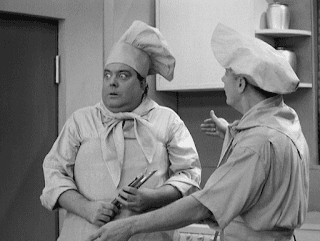If you know me, you know I often have a lot to say about a lot of things. I've found that I frequently use specific phrases that sometimes, taken literally, just don't make sense.
Yet, whoever I say them to understands what I'm saying. Take "Don't look a gift horse in the mouth," for example. I didn't gift anyone a horse. We weren't even talking about horses, yet you know that I mean you shouldn't stick your nose up at someone doing something nice for you.
I often find it funny how we as a society can use phrases like this, but we don't know where they came from. They all started somewhere and became part of our modern lexicon somehow.
On this website, I like to look back on how and where various things got their start. So, the other day, when I used one of these common sayings, I thought it would be fun to discover the origin of some of the most commonly used phrases.
Keep Reading to find out all about The History Behind 20 Common Phrases.
1. "Mind Your P's and Q's."
Meaning- Be on your best behavior or mind your manners.
Origin - The most common explanation for this saying comes from 17th Century English taverns and bars. The bartenders would keep watch over the "Pints" and "Quarts" consumed by their patrons, reminding them to "Mind their P's and Q's" and not get too rowdy.
2. "Balls To The Wall"
Meaning - Going all out and giving it your all.
Origin - Many think this saying has lewd implications, but it comes from the aviation industry! The throttle levers on a classic airliner, the Douglas DC-3, had rounded grips for the pilot's hands. The rounded grips looked like little balls sitting atop the levers, and it became a common expression amongst DC-3 pilots to go "Balls-To-The-Wall" when applying full power for takeoff.
 |
| A DC-3 Throttle Quadrant |
3. "Katie, Bar the Door!"
Meaning- Take precautions for trouble ahead.
Origin - One can trace the origin of "Katie, Bar the Door!" back to the story of Catherine Douglas and her attempt to save King James of Scotland in 1437. James was under attack from disgruntled common folk and hid in a room with a missing or broken locking bar on the door. The story goes that Catherine Douglas tries to save him by barring the door with her arm. Quickly, her arm is broken, and the mob murders the King, but the "lass that barred the door" - Catherine Douglas - was known from then on as Catherine Barlass.
The accuracy of that story is still up for debate, but it has been documented enough that dear old Katie's descendants still use the Barlass name today.
4. "The Whole 9 Yards!"
Meaning- To use or do everything possible or available.
Origin- Another phrase that was taken from the aviation industry, this one originated during World War II. Fighter pilots would have long chains of ammunition that were - you guessed it - 9 yards long. When they exhausted all of their ammo, they'd used "the whole 9 yards!"
5. Eighty-Six (86) it!
Meaning: To cancel, delete, or get rid of an item.
Origin: There are nearly 86 explanations for how this phrase came to be, but I'll just pick out a few of my favorites. In what I think is the most likely way 86 became widely used, military shorthand for throwing away something was "86." Where did they come up with this? Rotary phones (remember those?) had T on the number 8 and O on the 6, so to TO (throw out) something was to 86 it.
I've also heard the standard doorframe height was 8 feet 6 inches, so to show an unwanted guest the door was to be "86'd." Perhaps it also came from the bartender's term from the Wild West days. Most alcohol in the Old West was 100 proof, and when a patron got too drunk, the barkeep would serve him the less potent 86 proof liquor, thereby 86'ing them.
Lastly, the famed Delmonico's Restaurant in New York City had a vast menu, and item number 86 was the steak dinner. As the most popular item, it frequently sold out and morphed into shorthand for being out of an object.
6. "Read the Riot Act"
Meaning: To give a strong warning to improve behavior... or else.
Origin: Today, angry parents who "read the riot act" to their misbehaving children can look back to 18th century England where "The Riot Act" was an authentic document. Often recited aloud to angry mobs, the Riot Act was instituted in 1715, giving the British government the authority to label any group of more than 12 people a threat to the peace. A public official would read the small portion of the Riot Act and order the people to "disperse themselves and peaceably depart." Anyone remaining after one hour was subject to arrest or removal by force. In 1819, the law was tested in the "Peterloo Massacre" when a cavalry unit attacked a large group of protesters who ignored a reading of the Riot Act.
7. "Who Let the Cat Out of the Bag!?"
Meaning: To accidentally or carelessly reveal a secret.
Origin: Back in what is known as "the day," farmers would bring pigs to market wrapped and tied up in a bag. Some unscrupulous farmers would replace their pig with a stray cat, and if someone accidentally opened the bag (and let the cat out), the fraud would be revealed.
8. "It's Raining Cats and Dogs"
Meaning: It's raining very hard.
Origin: This idiom has two supported explanations. The first comes from Norse mythology, where cats symbolize heavy thunderstorms, and dogs are associated with the Odin, the god of storms and weather. The second version claims that in 16th century England, houses with thatched roofs were one of the few places animals were able to get warm. Cats and dogs would frequently climb up and nestle into the straw and other materials, and when it would rain heavily, the roof would get slippery. The cats and dogs would fall off, making it look like it's raining cats and dogs!
9. "Crocodile Tears"
Meaning: Tears and expressions of sorrow that are insincere or false.
Origin: Today, the phrase describes a display of superficial sorrow, but the saying derives from a medieval belief that crocodiles shed tears of sadness as they killed and consumed their prey. Dating back to the 14th Century, the book "The Travels of Sir John Mandeville" recounts a brave knight's adventures during his travel through Asia. Among its many tall tales, the book includes a description of crocodiles that notes, “These serpents slay men, and eat them weeping.” While only fiction, Mandeville’s account of weeping reptiles later found its way into the works of Shakespeare, and “crocodile tears” became an idiom in the early 16th century.
10. "Pleased as Punch"
Meaning: Filled with great delight and/or pride.
Origin: A puppet show from 1700s Europe called "Punch and Judy" featured an evil, maniacal character named Punch. Punch beats and murders several people in the puppet show, including his wife, a policeman, and other characters. After each murder, he's delighted and proud of himself and proclaims, "That's the way to do it!" The original phrase derived from this disturbing puppet was "as proud as Punch," but over time evolved into "Pleased as Punch."
11. "Paint the Town Red"
Meaning: Enjoying a night on the town frivolously or flamboyantly.
Origin: This phrase's origin alludes to unruly behavior that results in bloodshed. The most often repeated story is a tale dating back from 1837 in the English town of Melton Mowbray when the Marquis of Waterford and a group of friends had a wild night out. During this night, they knocked over flower pots, pulled knockers off doors, and broke several windows. One of the biggest acts of vandalism was painting several buildings and doors with red paint.
Another version of the creation story originates in the American "Wild West " brothels," where they referred to drunk men behaving as if the whole town was the red-light district.
12. "You're Barking Up the Wrong Tree"
Meaning: Following a mistaken line of thought or incorrect actions
Origin: This phrase has pretty simple roots. It refers to hunting dogs who chase their prey up into a tree. Once the target climbs the tree, the dogs bark at them, yet sometimes they will continue barking even if the prey has jumped into another tree.
13. "Resting On Your Laurels"
Meaning: To be so satisfied with past achievements, one makes no further effort.
Origin: The idea of resting on one's laurels dates back to the athletes of ancient Greece. In Hellenic times, laurel leaves were closely tied to the god of music and poetry, Apollo, who was usually depicted with a crown of laurel leaves. The plant eventually became a symbol of status and achievement, and victorious athletes at the ancient Pythian Games (the precursor to the modern Olympics) would receive wreaths made of laurel branches. The Romans later adopted this practice and presented wreaths to generals who won important battles. Respected Greeks and Romans, or "laureates," were thus able to "rest on their laurels" as they basked in the glory of past achievements. It's only recently that it took on a negative connotation, being used for those overly satisfied with past triumphs.
14. "Don't Look a Gift Horse In The Mouth"
Meaning: Finding fault with a gift or favor.
Origin: In the past, when people would buy a horse, they would determine the horse's health and age based on its teeth. After looking the horse over quite literally 'in the mouth,' the buyer would decide if they wanted to purchase the horse or not. It was considered impolite to do this when the horse was gifted to you, and this idiom was created to say it is rude to look for flaws in a free gift.
15. "Blue Blood"
Meaning: One of noble or higher class.
Origin: The saying that someone is a "blue blood" comes from the Middle Ages, where it is believed that those with paler skin were nobles or aristocrats. When one's skin is really pale, the veins are more visible and have a deep blue hue. Commoners would often consider those with pale skin aristocratic because they likely didn't have tanned or darker skin from not having to work outside in the sun like farmers and other laborers.
16. "Woke Up On The Wrong Side of the Bed"
Meaning: Starting the day in a bad mood.
Origin: Throughout history, the left side has always been considered bad or evil. With this concept in mind, getting out of the left side of the bed was not only bad luck but brought upon evil spirits. To ward off any evil, homeowners would push the bed into the corner so that guests (and themselves) have no option but to only get out on the right side.
17. "More Than You Can Shake a Stick At"
Meaning: A large quantity or amount of something.
Origin: This idiom also has a simple beginning. When farmers were herding their sheep, they would wave sticks at or around the sheep to get them to go where they wanted them to go. When they had too many sheep to control, they had more than they could "shake a stick at."
18. "Caught Red Handed"
Meaning: Caught in the act of wrong-doing.
Origin: Being "caught red-handed" has roots in 15th-century Scotland. Given how it was used in the earliest references, the phrase "red hand" or "red-handed" referred to people caught with blood on their hands from murder or poaching. The term would subsequently pop up numerous times in various legal proceedings in Scotland, nearly always referring to someone caught in the act of committing crimes, such as "apprehended redhand" or "taken with redhand."
19. "Hair of the Dog That Bit You"
Meaning: Consuming more of the item that made you ill, such as drinking alcohol to cure a hangover.
Origin: The expression "the hair of the dog" for an alcoholic drink taken to cure a hangover is a shortening of the "hair of the dog that bit you." This phrase comes from the old Scottish belief that someone bitten by a rabid dog could prevent or be cured of rabies by taking a potion that contained some of the dog's hair. The correlation suggests a smaller portion of the same thing that ails you will cure you. There's zero scientific evidence to prove either theory, though.
20. "Off the Record"
Meaning: A speaker who wishes to remain anonymous regarding their commentary.
Origin: This term began to be used widely in the 1930s when it was reported in a North Carolina newspaper that President Franklin Roosevelt attended a local party. Roosevelt was quoted as saying it was refreshing to talk to people "off the record" for a change where he could tell a few funny, off-color stories without having every word recorded by journalists. Before this, it was probably alluding to the act of striking irrelevant information from court records.
Bonus Phrase (just because I was curious)- "You Don't Know $#!% from Shinola!"
Meaning: Used to describe someone's ignorance or stupidity.
Origin: Shinola was a popular brand of shoe polish, and the original phrase ended in "and that's why your shoes don't shine." Putting it bluntly, using this phrase was saying that you were so dumb you don't know the difference between $#!% and shoe polish. I always wondered what Shinola was!













.png)





Comments